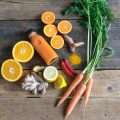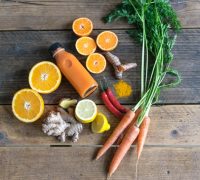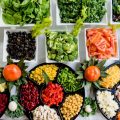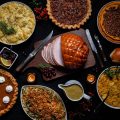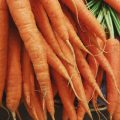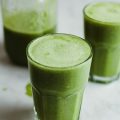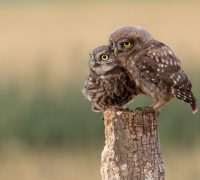Food choices often tend to reflect lifestyle choices and beliefs nowadays rather than just serving functional purposes (delivering energy). A thing that has to do with this is the freedom of choice that is abundant in many areas of modern living – you can decide what to eat because a wide range of food is available and most people have enough financial possibilities do make at least some choices, whereas in pre-modern societies, what was eaten was mostly determined by social rules and status and the traditional food spectrum that is specific to different cultures (think sunday roast, for example, standard porridge for breakfast, bread with cheese for dinner, etc – this will be different, of course, with regard to where you come from).
Anyway, freedom of choice also implies the necessity to decide, and which option you choose always tells something about yourself. You could have decided otherwise, and therefore the decisions you make reflect your thoughts and beliefs, or thoughtlessness, respectively. Your choices are also questionable by others, and therefore you as a person (given your choices are based on your thoughts or thoughtlessness, and these are part of you and define you in some way) are also questionable and may feel the need to legitimate your choices. (I could go on about this for hours – this is one of my all-time favorite topics in sociology and social psychology.)
Food has always been tied to identity, but I think the way it is has changed during the past decades. While it told more about cultural identity earlier, it tells more about individual identity now. This becomes especially salient when you look at special diets, like vegetarianism, veganism, paleo or primal, macrobiotics, raw foods, local eating, organic eating, etc. These diets are a kind of lifestyle actually, and if you turn to one of them it will affect your social life because there will be things you do not eat while most others do. And the others will, of course, notice. It is no coincidence that all these special diets come along with a big bag of theory and ideology to provide legitimation, rooting in ethics, ecology, evolution, spirituality, or whatever. Eating a special diet means confessing to a certain lifestyle.
“I don’t eat meat because I don’t want animals to suffer.”
“I don’t eat grains because humans haven’t evolved to eat them.”
“I don’t eat anything that comes from further away than 100 miles because that’s better for the environment.”
There you go.
What likely happens then is that people start associating with of like minds. This is very human, because humans are social beings by nature, and shared beliefs establish a steady ground for feelings of belonging. (It is also especially likely with regard to eating habits, because sharing food has always been a strong tie in social relationships.)
A phenomenon that is related to this, though, is what social psychologists call “group polarization”: If you mainly exchange with people that hold the same attitudes like you do, you will likely hear just confirmation of those attitudes rather than counter-arguments, what leads to more extreme opinions in the direction your opinion tended to originally. This will gradually make you become close-minded towards alternative perspectives. And the worst thing of all is when people become dogmatic and start preaching to proselytize others to do the same.
Another not-so-nice side effect of group building (that often occurs when people start to socialize with like minds) is that people do not only value members of their in-group higher, but also tend to derogate members of out-groups. This phenomenon can explain the rejection, contempt, or even hatred that is often experienced by those who dare to deviate from the way that is sketched by the social rules of the group – with regard to eating: those who start eating something again that is not contained in a certain diet’s spectrum of allowed foods and therefore not valued among those who follow this diet.
Have you been a vegan for some time, have you socialized with other vegans a lot, and now for some reason decided to eat animal products again? Off with your head. Have you eaten paleo for a while, and returned to grains again? Poor fool, wanting to be a loser in evoution. Have you eaten strictly locally, but got an appetite for something off-season and bought some fruit from overseas? Eco-killer. Etc etc.
It is very easy to get entangled in ideology, as well as ideological debates that easily shift to a personal level for the reasons mentioned above – you do not just argue in favor of a certain diet, but of yourself, because committing yourself to it has made it a part of your personal identity. I am also affected by this, because I have decided to eat paleo-style, and I have done my homework and know how to defend myself with rational arguments. If you told me that it was better for the planet to eat a vegetarian diet, I would answer you that the planet was very fine before the invention of agriculture. If you told me that it was unethical to eat a living being, I would respond that plants are living beings as well, and just because we cannot hear them cry does not mean they do not. If you told me it that it was healthier to eat a plant-based diet, I would say that you will likely lack important nutrients and have problems getting appropriate protein.
But does this take us somewhere? No. It is just straining. I do not like to argue, and I do not want to convince anybody to do what I do because I do not know if what is the best for me also would be the best for you. Most important, it does not hit the central point about eating at all: that food should always promote health, well-being, and nourishment. I believe that certain diets are better in that regard than others, which is supported by scientific evidence, but this does no say it applied to everybody. Scientific research is always evaluated across people, meaning that what you are told as “results” are average tendencies. It may be the case that a certain diet is appropriate for a certain quantity of people which is of sufficient size to make the statistics slip into the area of significance. However, you can be sure there are always people who do not respond according to the average tendency. (Those people’s responds make up what is called “error variance” in statistics.) So if you are able to achieve health and nourishment with a certain diet, please eat that way. I will not judge you but be happy for you that you have found out what works for you. (I know how hard this can be.) And please let me eat my way and do not judge me either. But it would be great if we could just talk to each other and share experiences, regardless of all ideological issues lurking in the background, to find out what is really good for us.
Be fine with what you eat. Please do not feel ashamed. Just appreciate your food, and be thankful for the plants and animals that nourish you. Do not eat for ideology. Eat for health and well-being, and nourishing your body. Eat for yourself.



